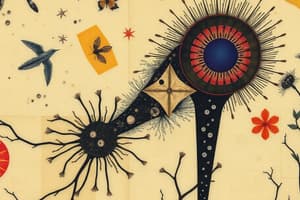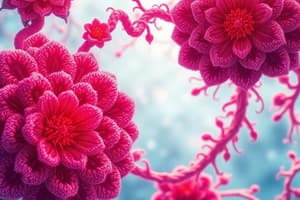Podcast
Questions and Answers
What describes mutualism in symbiotic relationships?
What describes mutualism in symbiotic relationships?
- One organism benefits while the other is unaffected.
- One organism benefits at the expense of the other.
- Both organisms benefit from the interaction. (correct)
- Both organisms compete for the same resources.
Which of the following best defines predation in ecological terms?
Which of the following best defines predation in ecological terms?
- A relationship where one organism is harmed while the other benefits.
- The process by which two species compete for the same food resource.
- An interaction between organisms living in close proximity without direct interaction.
- The interaction where one organism captures and feeds on another. (correct)
What is a potential consequence of reduced biodiversity in an ecosystem?
What is a potential consequence of reduced biodiversity in an ecosystem?
- Decreased resource availability. (correct)
- Increased competition among species.
- Enhanced genetic diversity.
- Improved ecosystem resilience.
Which ethical consideration is most closely associated with genetic engineering?
Which ethical consideration is most closely associated with genetic engineering?
What is one of the main functions of food webs in an ecosystem?
What is one of the main functions of food webs in an ecosystem?
Which branch of biology focuses specifically on the processes by which organisms grow and develop from a single cell?
Which branch of biology focuses specifically on the processes by which organisms grow and develop from a single cell?
What is the primary focus of molecular biology?
What is the primary focus of molecular biology?
Which of the following describes the process by which plants convert light energy into chemical energy?
Which of the following describes the process by which plants convert light energy into chemical energy?
Which statement accurately reflects the concept of homeostasis in living organisms?
Which statement accurately reflects the concept of homeostasis in living organisms?
What term is used to describe the science of classifying organisms?
What term is used to describe the science of classifying organisms?
Which type of cell division results in four genetically unique daughter cells?
Which type of cell division results in four genetically unique daughter cells?
According to evolutionary theory, what is the primary driver for the diversification of species?
According to evolutionary theory, what is the primary driver for the diversification of species?
Which of the following is NOT a key biological process?
Which of the following is NOT a key biological process?
Flashcards
What is a cell?
What is a cell?
The fundamental unit of life, all living organisms are composed of cells.
What is biology?
What is biology?
The scientific study of life and all its forms, including structure, function, growth, origin, evolution, and distribution.
What is photosynthesis?
What is photosynthesis?
The process by which plants convert light energy into chemical energy in the form of sugars.
What is homeostasis?
What is homeostasis?
Signup and view all the flashcards
What is reproduction?
What is reproduction?
Signup and view all the flashcards
What is taxonomy?
What is taxonomy?
Signup and view all the flashcards
What are the three domains of life?
What are the three domains of life?
Signup and view all the flashcards
What is cellular respiration?
What is cellular respiration?
Signup and view all the flashcards
Biodiversity
Biodiversity
Signup and view all the flashcards
Predation
Predation
Signup and view all the flashcards
Competition
Competition
Signup and view all the flashcards
Food Chain
Food Chain
Signup and view all the flashcards
Food Web
Food Web
Signup and view all the flashcards
Study Notes
Introduction to Biology
- Biology is the scientific study of life and living organisms, encompassing their structure, function, growth, origin, evolution, and distribution.
- It ranges from molecular to ecosystem levels.
Branches of Biology
- Molecular Biology: Studies the structure and function of molecules crucial for life, like DNA, RNA, and proteins.
- Cell Biology: Investigates the structure and function of cells, the fundamental units of life.
- Genetics: Examines heredity and variations in inherited traits.
- Developmental Biology: Explores the processes that shape organisms from a single cell to their mature form.
- Evolutionary Biology: Studies the origins and diversification of species over time.
- Ecology: Examines interactions between organisms and their environment.
- Physiology: Investigates the functions of organisms and their components.
- Botany: Focuses on plants.
- Zoology: Studies animals.
- Microbiology: Investigates microorganisms.
Fundamental Concepts in Biology
- Cell Theory: Defines the cell as the fundamental unit of life.
- Evolutionary Theory: Proposes that all life shares a common ancestor, diversifying through natural selection.
- Homeostasis: An organism's ability to maintain a stable internal environment.
- Metabolism: All chemical reactions within an organism to sustain life.
- Reproduction: The process of creating new individuals.
Key Biological Processes
- Photosynthesis: Plants convert light energy to chemical energy (sugars).
- Cellular Respiration: Cells break down organic molecules to release energy.
- DNA Replication: Copying DNA for cell division.
- Protein Synthesis: Creating proteins using DNA instructions.
- Mitosis: Cell division producing two identical daughter cells.
- Meiosis: Cell division producing four genetically unique daughter cells for sexual reproduction.
Diversity of Life
- Taxonomy: The science of classifying organisms.
- Three Domains of Life: Bacteria, Archaea, and Eukarya.
- Classification Hierarchy: Kingdoms, Phyla, Classes, Orders, Families, Genera, and Species.
- Biodiversity: Variation of life on Earth at all levels.
- Importance of biodiversity: Supports ecosystem health and provides resources.
Biological Interactions
- Predation: Interactions between predators and prey.
- Competition: Organisms vying for the same resources.
- Symbiosis: Close interactions between different species:
- Mutualism: Both benefit
- Commensalism: One benefits, the other is unaffected
- Parasitism: One benefits, the other is harmed.
- Food Webs and Chains: Complex interactions representing energy and material flows among organisms.
Ethical Considerations in Biology
- Responsible use of biological knowledge and technology.
- Ethical implications of genetic engineering and biotechnology.
- Considerations regarding animal testing and conservation.
- Ethical guidelines for research and reporting.
Studying That Suits You
Use AI to generate personalized quizzes and flashcards to suit your learning preferences.




